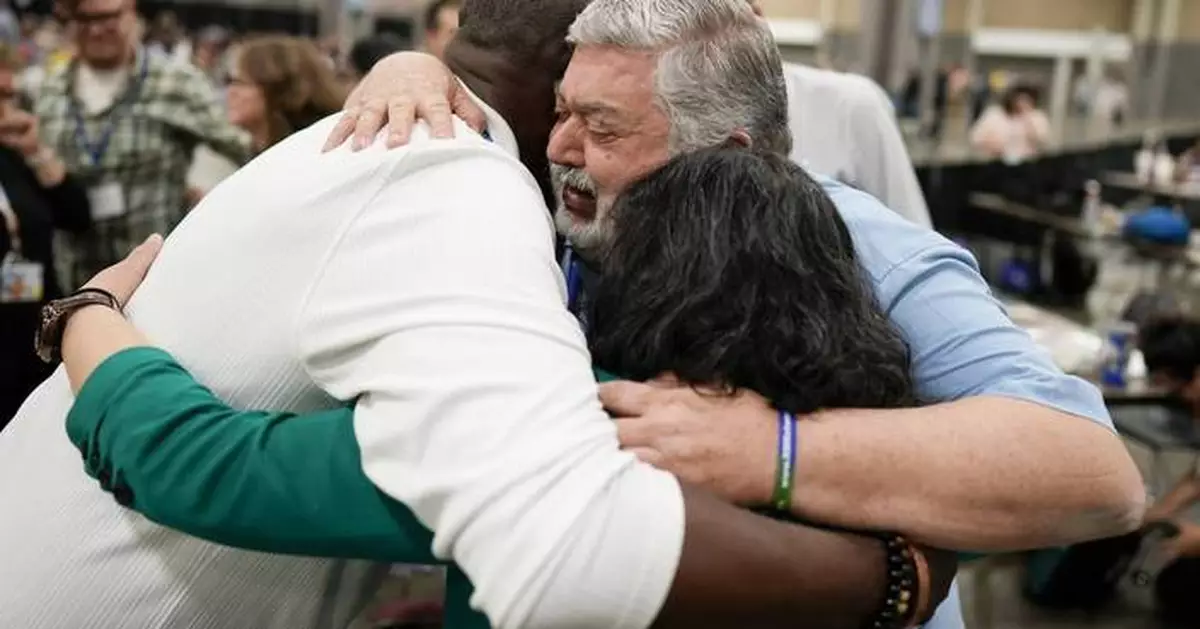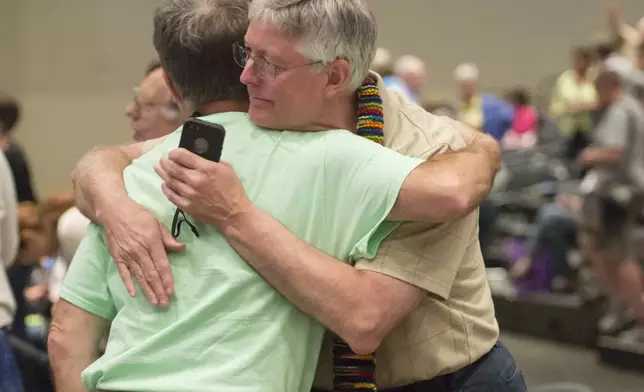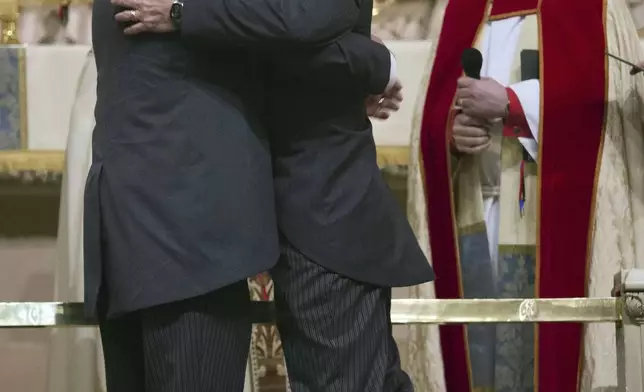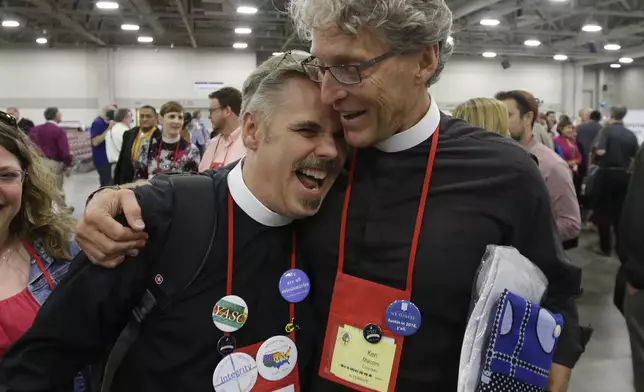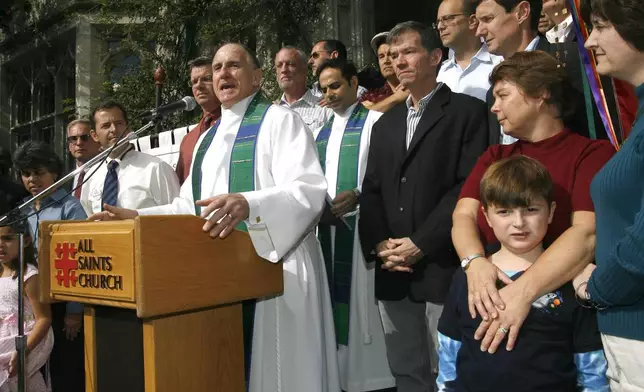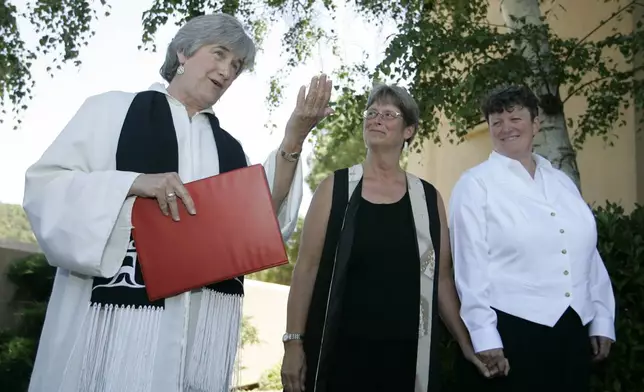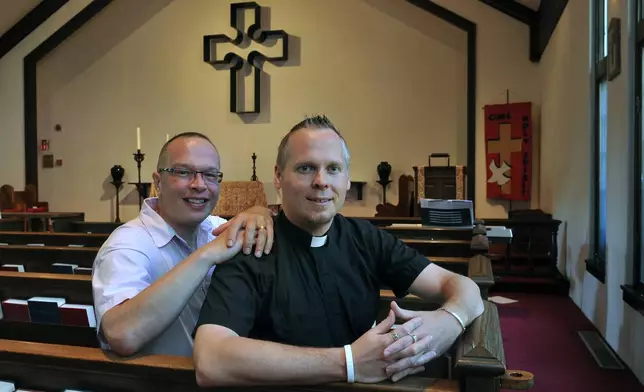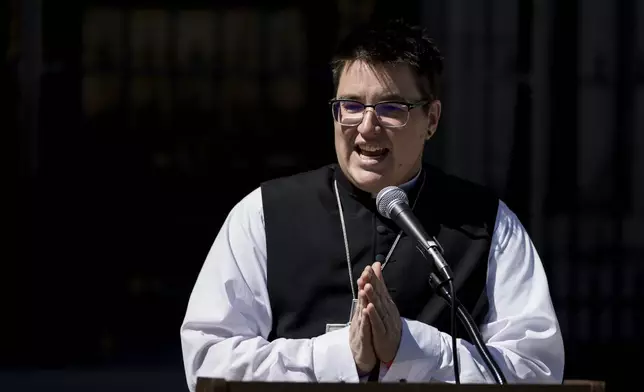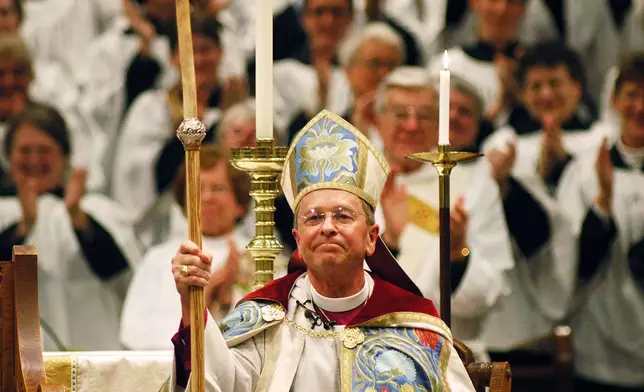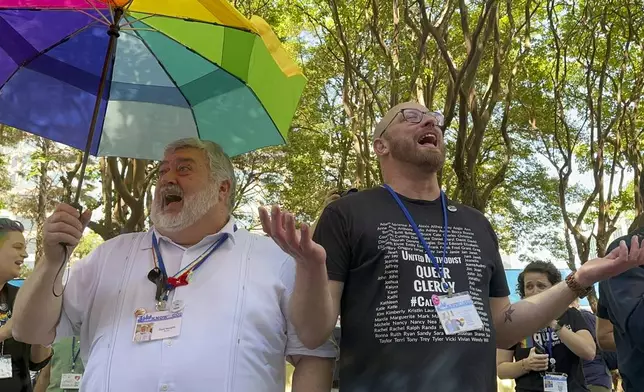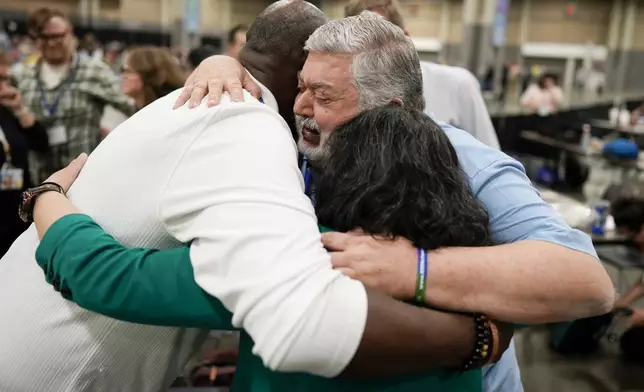CHARLOTTE, N.C. (AP) — It took just a few days for United Methodist delegates to remove a half-century's worth of denominational bans on gay clergy and same-sex marriages.
But when asked at a news conference about the lightning speed of the changes, the Rev. Effie McAvoy took a longer view.
“Oh, it didn’t take days, honey," she said.
It took decades of activism for a change that was "so very healing," said McAvoy, pastor of Shepherd of the Valley United Methodist Church in Hope, Rhode Island. A member of the Queer Delegate Caucus at last week's UMC General Conference in Charlotte, she was grateful to be part of the historic moment.
The reversals can be seen as marking the end of a half-century of epic battles and schisms over LGBTQ involvement — not only in the United Methodist Church but in U.S. mainline Protestant denominations overall. Those are the tall-steeple churches in myriad town squares and rural crossroads, traditionally “big-tent” and culturally mainstream congregations — some predating America's independence.
The nation’s largest Methodist, Presbyterian, Episcopal and Lutheran denominations have all now removed barriers to LGBTQ participation in the pulpit and at the altar. But this comes amid long-term declines in membership and influence.
Surely there will be skirmishes to come. Individual congregations, and entire regions across the world, will sort out the implications. Controversies have grown among some conservative evangelical churches and colleges, which largely avoided past battles.
But for mainline Protestants, last week’s General Conference looks like a landmark. It was a relatively quiet coda to what had been an almost annual scene on America's religious calendar — impassioned showdowns at legislative assemblies of Protestant denominations, marked by protests, political maneuverings and earnest prayers.
Across the decades, there were many cases of ecclesiastical civil disobedience — clergy doing ordinations and marriages that defied church bans, some of whom were tried for heresy or other infractions.
“A part of me still doesn’t believe it,” said the Rev. Frank Schaefer, one of the last United Methodist ministers to face church discipline after presiding at the same-sex wedding of his son. Schaefer was restored to ministry in 2014 by a Methodist appellate panel after a lower tribunal had defrocked him.
“We’ve fought for it so long and hard, and there were so many disappointments along the way," said Schaefer, now a pastor in California. "Our tears have turned into tears of joy.”
But the UMC faces the same dire challenges as Lutheran, Presbyterian, Episcopal and smaller mainline denominations that took similar routes.
All lost large numbers of congregations in schisms, and they have had to navigate fraught relations with partner churches in Africa and elsewhere.
Retired United Methodist Bishop Will Willimon, a professor at Duke Divinity School, supported greater LGBTQ inclusion in the church — but said bigger issues loom..
“We’re an aging denomination,” he said. "We share that with so many mainline denominations. Unfortunately I don’t see how this vote addresses any of that.”
Willimon said even conservative breakaway groups like the new Global Methodist Church, comprised of many former UMC congregations, face similar challenges with predominately white, aging memberships.
In the U.S., mainline churches have lost millions of members since their peak in the 1960s — some to schism and many to underlying demographics. Their members are aging and don’t have many children, and they struggle to retain the children they do have, said Ryan Burge, associate professor of political science at Eastern Illinois University.
“There is no silver bullet” for reversing mainline decline, said Burge, who studies religious demographics.
The United Methodists counted 5.4 million U.S. members in 2022 — less than half their 1960s peak, and the recent departure of about 7,600 mostly conservative congregations will lower that number further. The Presbyterian Church (U.S.A.)'s 1.1 million membership is barely a quarter its 1960s peak. Other denominations have similar trends.
The mainline battles over LGBTQ issues began heating up in the early 1970s, before those initials were used.
A United Methodist General Conference in 1972 declared homosexual practice “incompatible with Christian teaching.” Other denominations issued similar teachings. Some imposed explicit bans on gay clergy.
An Episcopal bishop was tried and acquitted of heresy in 1996 for ordaining a gay pastor. The 2003 ordination of the first openly gay Episcopal bishop, Gene Robinson, ignited long-simmering controversies.
Conservative and liberal groups formed their own church caucuses for denominational legislative sessions, where Scriptures and slogans flew back and forth between proclamations of Robert's Rules of Order.
Progressive Presbyterians blocked an entrance to a General Assembly in 2000 and were arrested. As the United Methodists steadily tightened LGBTQ bans, progressives disrupted General Conferences with protests, drums and songs. A conservative United Methodist leader, the Rev. Bill Hinson, roiled the 2004 General Conference in Pittsburgh with a call for denominational divorce — even though his side had won all its legislative battles.
“Why do we go on hurting each other?” asked Hinson. Others quickly tamped down the idea, but it was a foreshadowing.
By the second decade of the 21st century, Presbyterians, Lutherans and Episcopalians had largely dismantled their bans. They navigated major strains with partner churches elsewhere in the world.
Substantial minorities of their U.S. congregations joined more conservative denominations, saying the sexuality debates were symptoms of a deeper theological chasm.
The United Methodist Church is unique because it is international, with many delegates from countries with conservative sexual values and laws. A special legislative session in 2019 reinforced LGBTQ bans.
That result proved short-lived.
U.S. churches increasingly defied the bans and elected more progressive delegates for this year's gathering. Many churches began disaffiliating under a temporary measure approved in 2019 that let churches keep their properties under favorable conditions.
To Willimon, that process was devastating. Whether the congregation stayed or left, peoples' relationships were ruptured, he said.
Many churches went independent, but thousands joined the new Global Methodist Church, which pledges to enforce restrictions on LGBTQ clergy and same-sex marriage.
Now attention turns to Africa, where the UMC counts 4.6 million members.
One group of African delegates protested outside the General Conference and said their members would discuss whether to disaffiliate.
“The General Conference did not listen to us,” said the Rev. Jerry Kulah of the conservative group, Africa Initiative, contending the denomination departed from biblical teaching on marriage. “We do not believe we know better than Jesus."
Bishop John Wesley Yohanna of Nigeria said he would likely leave the denomination after his term ends, though he is staying for now to help heal a rift in the local church. “From the tradition of the church in Africa,” he added, “marriage is between a man and a woman, period.”
But other African delegates are heartened by a plan that expands regional autonomy on such matters. They said African churches will keep the marriage and ordination bans in their region while remaining in the denomination.
“Our decision to stay in the United Methodist Church is not conditioned by what happens in America,” said the Rev. Ande Emmanuel of Southern Nigeria. “God has called us to a church, and the church is not a property of the United States.”
Bishop Eben Nhiwatiwa of Zimbabwe the majority of the African bishops at General Conference agree the regionalization plan respects local cultures.
The United Methodist Church was the last of the major U.S. mainline groups to liberalize its policies on sexuality in part because of its large presence in rural, small-town and Southern areas, where a more conservative sexual ethos prevails, said James Hudnut-Beumler, a professor of American Christian History at Vanderbilt University. He is a Presbyterian Church (U.S.A.) minister and co-author of “The Future of Mainline Protestantism.”
“That’s why they’re the last to go,” he said.
And it won’t automatically bring back the more-accepting younger generations who left over the bans, said Hudnut-Beumler, adding that conservative evangelical congregations are not exempt.
“Some conservative megachurch pastor may be thinking to himself, ‘We won this. Look what happened to the Methodists and Presbyterians and Episcopalians,’” said Hudnut-Beumler, “Don’t be so smug.”
AP reporter Holly Meyer contributed from Nashville, Tennessee.
Associated Press religion coverage receives support through the AP’s collaboration with The Conversation US, with funding from Lilly Endowment Inc. The AP is solely responsible for this content.

FILE - In this June 19, 2014, file photo, Gary Lyon, left, and Bill Samford celebrate after a vote allowing Presbyterian pastors discretion in marrying same-sex couples at the 221st General Assembly of the Presbyterian Church at Cobo Hall, in Detroit. When the United Methodist Church removed anti-LGBTQ language from its official rules in recent days, it marked the end of a half-century of debates over LGBTQ inclusion in mainline Protestant denominations. The moves sparked joy from progressive delegates, but the UMC faces many of the same challenges as Lutheran, Presbyterian and Episcopal denominations that took similar routes, from schisms to friction with international churches to the long-term aging and shrinking of their memberships. (David Guralnick/Detroit News via AP, file)

FILE - Tim Bostic, right, and Tony London hug each other after the Witnessing of the Vow ceremony at Christ & St. Luke's Episcopal Church for their wedding ceremony on Saturday, May 2, 2015 in Norfolk, Va. When the United Methodist Church removed anti-LGBTQ language from its official rules in recent days, it marked the end of a half-century of debates over LGBTQ inclusion in mainline Protestant denominations. The moves sparked joy from progressive delegates, but the UMC faces many of the same challenges as Lutheran, Presbyterian and Episcopal denominations that took similar routes, from schisms to friction with international churches to the long-term aging and shrinking of their memberships. (The' N. Pham/The Virginian-Pilot via AP, file)

FILE - The Rev. Michael Briggs, left, and the Rev. Ken Malcolm, right, hug as they walk after Episcopalians overwhelmingly voted to allow religious weddings for same-sex couples Wednesday, July 1, 2015, in Salt Lake City. When the United Methodist Church removed anti-LGBTQ language from its official rules in recent days, it marked the end of a half-century of debates over LGBTQ inclusion in mainline Protestant denominations. The moves sparked joy from progressive delegates, but the UMC faces many of the same challenges as Lutheran, Presbyterian and Episcopal denominations that took similar routes, from schisms to friction with international churches to the long-term aging and shrinking of their memberships. (AP Photo/Rick Bowmer, File)

FILE - Rev. Edwin Bacon, of All Saints Episcopal Church, speaks out during a press conference in support of same sex marriages and in fighting Proposition 8, Sunday, Nov. 9, 2008, in Pasadena, Calif. When the United Methodist Church removed anti-LGBTQ language from its official rules in recent days, it marked the end of a half-century of debates over LGBTQ inclusion in mainline Protestant denominations. The moves sparked joy from progressive delegates, but the UMC faces many of the same challenges as Lutheran, Presbyterian and Episcopal denominations that took similar routes, from schisms to friction with international churches to the long-term aging and shrinking of their memberships. (AP Photo/Gus Ruelas, File)

FILE - The Reverend Dr. Jane Spahr, left, a Presbyterian minister, performs a same-sex marriage for Sherrie Holmes, center, and Sara Taylor, right, at the Marin Civic Center in San Rafael, Calif., Friday, June 20, 2008. When the United Methodist Church removed anti-LGBTQ language from its official rules in recent days, it marked the end of a half-century of debates over LGBTQ inclusion in mainline Protestant denominations. The moves sparked joy from progressive delegates, but the UMC faces many of the same challenges as Lutheran, Presbyterian and Episcopal denominations that took similar routes, from schisms to friction with international churches to the long-term aging and shrinking of their memberships. (AP Photo/Eric Risberg, File)

FILE - The Very Rev. Christopher D. Hofer, right and his partner of 17 years, Kerry Brady at Hofer's parish, the Episcopal Church of St. Jude on Thursday, July 14, 2011 in Wantagh, N.Y., where they plan to wed in August. When the United Methodist Church removed anti-LGBTQ language from its official rules in recent days, it marked the end of a half-century of debates over LGBTQ inclusion in mainline Protestant denominations. The moves sparked joy from progressive delegates, but the UMC faces many of the same challenges as Lutheran, Presbyterian and Episcopal denominations that took similar routes, from schisms to friction with international churches to the long-term aging and shrinking of their memberships. (AP Photo/Kathy Kmonicek)

FILE - Bishop Megan Rohrer speaks to the press before their installation ceremony at Grace Cathedral in San Francisco, Saturday, Sept. 11, 2021.When the United Methodist Church removed anti-LGBTQ language from its official rules in recent days, it marked the end of a half-century of debates over LGBTQ inclusion in mainline Protestant denominations. The moves sparked joy from progressive delegates, but the UMC faces many of the same challenges as Lutheran, Presbyterian and Episcopal denominations that took similar routes, from schisms to friction with international churches to the long-term aging and shrinking of their memberships. (AP Photo/John Hefti)

FILE - In this Sunday, March 7, 2004 file photo, Gene Robinson is applauded after his investiture as the Episcopal Church's bishop of New Hampshire at St. Paul's Church in Concord, N.H. When the United Methodist Church removed anti-LGBTQ language from its official rules in recent days, it marked the end of a half-century of debates over LGBTQ inclusion in mainline Protestant denominations. The moves sparked joy from progressive delegates, but the UMC faces many of the same challenges as Lutheran, Presbyterian and Episcopal denominations that took similar routes, from schisms to friction with international churches to the long-term aging and shrinking of their memberships. (AP Photo/Lee Marriner, File)

FILE - The Rev. David Meredith, left, and the Rev. Austin Adkinson sing during a gathering of those in the LGBTQ community and their allies outside the Charlotte Convention Center, in Charlotte, N.C., Thursday, May 2, 2024. When the United Methodist Church removed anti-LGBTQ language from its official rules in recent days, it marked the end of a half-century of debates over LGBTQ inclusion in mainline Protestant denominations. The moves sparked joy from progressive delegates, but the UMC faces many of the same challenges as Lutheran, Presbyterian and Episcopal denominations that took similar routes, from schisms to friction with international churches to the long-term aging and shrinking of their memberships. (AP Photo/Peter Smith, File)

FILE - David Meredith, middle, hugs fellow observers after an approval vote at the United Methodist Church General Conference Wednesday, May 1, 2024, in Charlotte, N.C. When the United Methodist Church removed anti-LGBTQ language from its official rules in recent days, it marked the end of a half-century of debates over LGBTQ inclusion in mainline Protestant denominations. The moves sparked joy from progressive delegates, but the UMC faces many of the same challenges as Lutheran, Presbyterian and Episcopal denominations that took similar routes, from schisms to friction with international churches to the long-term aging and shrinking of their memberships. (AP Photo/Chris Carlson, File)


